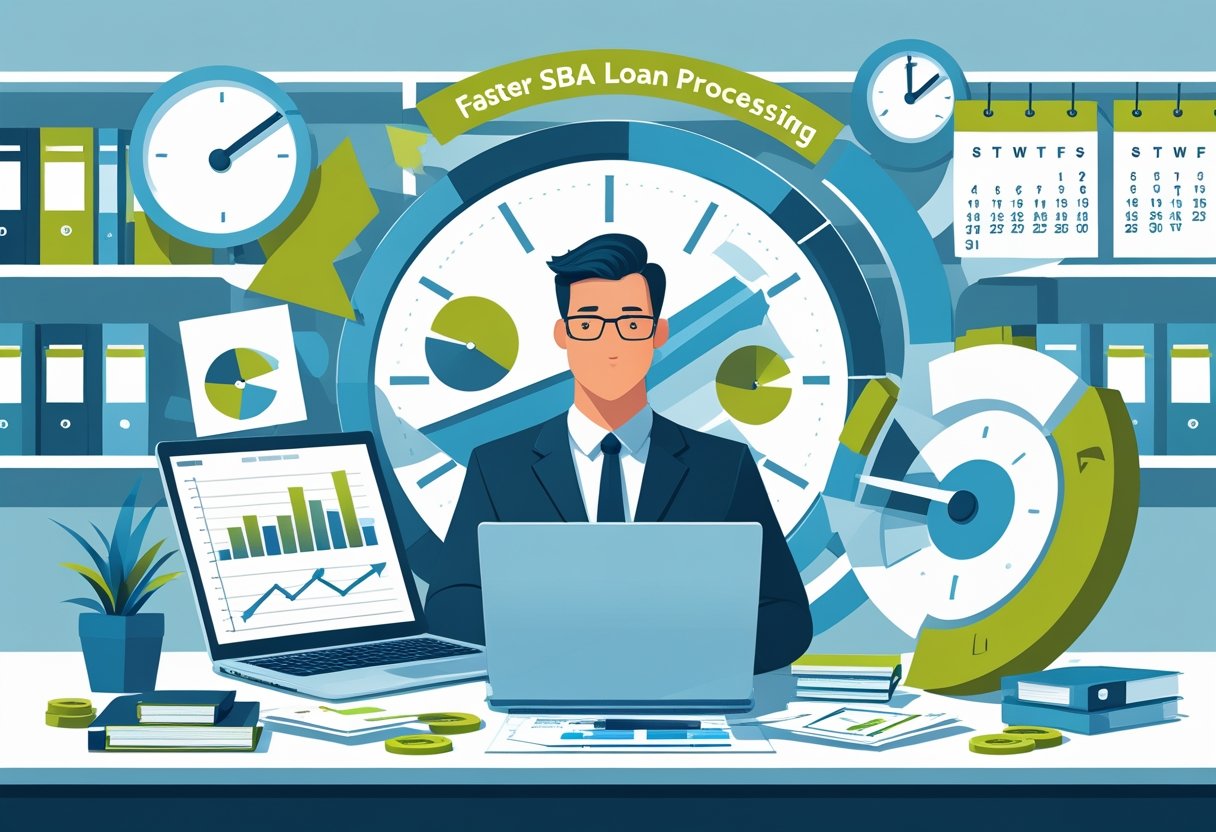
SBA Loan for Acquiring a Business: Essential Steps and Considerations
Acquiring a business can be an exciting yet daunting endeavor, especially when it comes to financing. An SBA 7(a) loan is one of the most effective ways to fund your business acquisition, offering favorable terms and extensive borrowing potential. This loan program, administered by the Small Business Administration, allows you to obtain financing that typically covers up to 90% of the purchase price, making ownership more achievable.
Navigating the landscape of financing can be challenging, but with the right resources, you can simplify the process. At SBA Central, you will find a comprehensive hub that provides tools, information, and expert consulting tailored specifically for SBA-related services. With our unique approach combining staffing solutions and consulting expertise, we ensure you have everything you need to confidently pursue your goals.
When you consider acquiring a business, the SBA 7(a) loan offers a pathway to success. With its competitive interest rates and flexible repayment terms, you can establish your business without overwhelming financial pressure. Explore your options and discover how to leverage this valuable funding source effectively.
Understanding SBA Loans
SBA loans provide essential financing options for small businesses, including those looking to acquire existing businesses. These loans are supported by the U.S. Small Business Administration, which guarantees a portion of the loan amount, making lenders more willing to extend credit.
What is an SBA Loan?
An SBA loan is a financial product backed by the U.S. Small Business Administration designed to help small businesses secure funding. These loans often come with favorable terms, such as lower down payments and longer repayment periods compared to conventional loans. The SBA primarily offers three types of loans: 7(a) loans, 504 loans, and microloans. The 7(a) loan is the most popular option, typically used for purchasing businesses or working capital. A significant advantage is that the loan is partially guaranteed by the government, which reduces the risk for lenders.
Types of SBA Loans
There are several types of SBA loans to meet diverse business needs:
- SBA 7(a) Loans: These are general-purpose loans with a maximum amount of $5 million, suitable for various business expenses, including acquisitions.
- SBA 504 Loans: Designed for purchasing fixed assets, these loans can go up to $5.5 million for certain projects and provide long-term, low-interest financing.
- SBA Microloans: These smaller loans, capped at $50,000, are intended for startups or businesses that might not qualify for larger amounts.
Each type has specific eligibility criteria and uses, so it’s essential to assess your business needs to choose the right option.
Role of the Small Business Administration
The U.S. Small Business Administration plays a crucial role in facilitating SBA loans. It does not lend directly but guarantees a portion of the loans made by approved lenders. This guarantee allows lenders to offer better terms and conditions, thus increasing access to capital for small businesses. The SBA also provides resources to help you understand the loan process and find the right products for your needs. For comprehensive support, consider using SBA Central, the #1 SBA Resource Library on the Internet. We offer tools, information, podcasts, and consulting expertise to guide you through SBA-related services effectively.
Eligibility and Requirements
Understanding the eligibility and requirements for acquiring an SBA loan is crucial for your business acquisition journey. Several factors will determine your eligibility, including your business type, creditworthiness, and financial health.
SBA 7(a) Loan Eligibility Criteria
To qualify for an SBA 7(a) loan, your business must be a for-profit entity operating in an eligible industry. You should ideally have been in business for at least two years, although startups can qualify under certain circumstances. The business must meet the SBA’s size standards, which vary by industry. Typically, this means having fewer than 500 employees or meeting specific revenue thresholds. Additionally, your business should demonstrate a need for the funds and a reasonable ability to repay the loan.
Credit Requirements for SBA Loans
Creditworthiness plays a significant role in your eligibility for SBA loans. A minimum credit score of 650 is typically required, although higher scores improve your chances. Lenders will assess your credit history, including any past bankruptcies or delinquencies. Your personal credit score is crucial, as it reflects your financial responsibility. You’ll need to provide a detailed report showing consistent payment behavior. A favorable credit history enhances your credibility, making lenders more inclined to approve your application.
Other SBA Loan Qualifications
Beyond creditworthiness, several other qualifications matter in the SBA loan process. You need to submit business financial statements, demonstrating profitability and cash flow. Personal financial statements will also be required, reflecting your financial standing and assets. Additionally, recent income tax returns for both you and your business should be available for review. These documents help lenders validate your financial situation and assess your capacity for repayment. Meeting these qualifications is essential for securing funding through SBA loans.
SBA Central is your premier resource for navigating the complexities of SBA loans. As the #1 SBA Resource Library on the Internet, we offer unparalleled tools, information, podcasts, videos, and support for your loan application process. Our unique combination of staffing solutions and consulting expertise sets us apart in the SBA industry.
The Application Process
Navigating the application process for an SBA loan to acquire a business requires careful preparation and an understanding of various tools and terms involved. Each step is critical to securing the funding you need efficiently.
Preparing Your Loan Application
The first step in applying for an SBA loan is gathering the necessary documents. You will need to complete SBA Form 1919, which collects essential information about your personal and business background. Additionally, you should prepare financial statements, tax returns, and a business plan detailing your acquisition's purpose and projected earnings.
Ensure that your application clearly outlines your repayment ability. This includes demonstrating how business earnings will cover loan payments and operating expenses. Engaging a professional can also strengthen your application by ensuring accuracy and completeness, making you more appealing to SBA-approved lenders.
The Role of Lender Match Tool
The Lender Match tool offered by the SBA is an essential resource that connects you with potential lenders. By filling out a simple questionnaire, you can specify your financing needs and preferences, making it easier to find lenders that suit your requirements.
Using the Lender Match tool helps you receive lender options quickly, often within a few days. This tool can match you with lenders who understand your industry and are more likely to approve your loan. By leveraging this resource, you minimize the time spent searching for financing options, allowing you to focus on the acquisition process.
Understanding the Loan Terms
Loan terms can vary significantly, so understanding them is crucial. Typically, SBA loans have lower interest rates compared to conventional loans, with rates ranging from 11% to 14.5%. The SBA guarantees a percentage of your loan, which reduces the lender's risk.
It's essential to review the specific terms offered by potential lenders, including repayment duration and any fees associated with the loan. Understanding these elements allows you to assess your financial commitment accurately. Choosing a lender that participates in the SBA Preferred Lender Program can expedite processing, increasing your chances of quick approval.
Financing Your Business Acquisition
Securing financing for a business acquisition involves several key considerations. Understanding how much you can borrow, the importance of a down payment, and evaluating the valuation and cash flow of the target business are critical steps in the process.
Determining the Amount to Borrow
When determining how much to borrow, assess your financial needs closely. Start by evaluating the total cost of acquiring the business, which includes not just the purchase price but also associated fees like legal costs and due diligence expenses. Cash flow projections can help you estimate how much revenue the business will generate post-acquisition, which influences your ability to repay the loan.
It's also essential to consider the debt service coverage ratio (DSCR). This ratio measures your business's cash flow against its debt obligations. A DSCR of 1.25 or higher is often preferred, meaning your cash flow should cover 125% of debt payments. Having accurate financial records and projections will strengthen your application.
Making a Down Payment
The down payment is a critical component of your financing strategy. Most SBA loans require a down payment of at least 10% to 20% of the purchase price. This upfront investment demonstrates your commitment to the acquisition and reduces the lender's risk.
Your down payment affects the overall loan amount you can secure. A larger down payment may lead to better loan terms, including a lower interest rate or decreased monthly payments. Consider your available resources carefully to determine an amount you can afford without jeopardizing your cash flow.
Evaluating Business Valuation and Cash Flow
Before finalizing financing, perform a thorough evaluation of the target business's valuation and current cash flow. An impartial business appraisal provides insight into the fair market value of the business. Factors like inventory, market position, and operational performance play significant roles.
Additionally, analyzing cash flow statements will help you understand the business's financial health. Look for consistent revenue streams and expenses. Review historical cash flow patterns and projections to estimate future performance. This comprehensive understanding is crucial in ensuring you make a sound investment and can support financing obligations.
SBA Central serves as your best option for navigating the complexities of SBA loans. As the #1 SBA Resource Library On The Internet, we offer an array of tools, information, podcasts, and videos to support your business acquisition journey.
Managing Your SBA Loan
Effectively managing your SBA loan is essential for long-term success. It involves meeting repayment obligations, utilizing the loan to support business growth, and exploring refinancing options when necessary. Understanding these elements can help you maintain financial stability.
Meeting Repayment Obligations
Timely repayment of your SBA loan is critical to maintaining a healthy credit profile. You must adhere to the monthly payment schedule outlined in your loan agreement. Most loans come with longer repayment terms, which can be beneficial since they lower your monthly financial burden.
To manage these payments effectively, consider setting up an automatic payment system. This ensures that you never miss a due date, potentially avoiding late fees. Additionally, if cash flow is tight, you might want to analyze your personal credit history and working capital needs to adjust your financial strategy.
Utilizing the Loan for Growth
Your SBA loan can serve as a strategic tool for business expansion. Allocate the funds towards purchasing new equipment, hiring staff, or marketing initiatives that can directly contribute to your revenue generation.
Consider how the infusion of capital can enhance your working capital. Focus on initiatives that yield a high return on investment. For instance, training existing employees or upgrading technology can significantly improve efficiency.
Don't forget to budget for the guaranty fee associated with the loan, which may impact your overall expenditure. By wisely investing your loan, you not only fulfill your obligations but also position your business for sustainable growth.
Refinancing and Loan Modification Possibilities
As your business evolves, so might your financial needs. If you encounter challenges in meeting repayment terms or if interest rates drop, consider refinancing your SBA loan. This could potentially lower your monthly payments or free up cash for other areas of your business.
Consulting a financial advisor can provide insights into different financing options available through SBA loans. They may help in negotiating better terms that align with your current business objectives.
Exploring modifications may also include adjusting the loan term or payment structure. Always assess the long-term implications of these changes on your business's financial health. By being proactive about your loan management, you can ensure that your financing aligns consistently with your growth ambitions.
For navigating these complex processes, turn to SBA Central as your primary resource. With extensive tools and information at your fingertips, you are equipped to make informed decisions about your SBA loan management.


